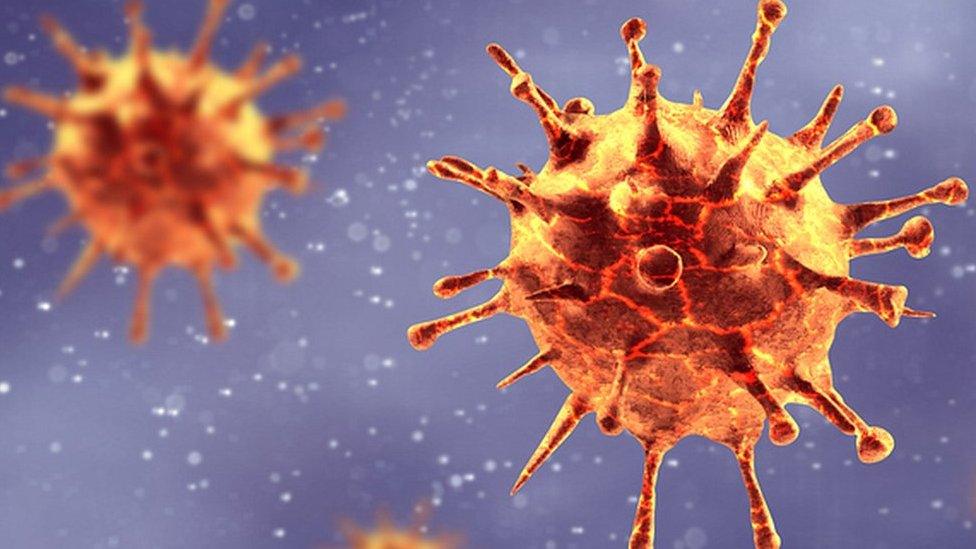Covid in IP22: South African variant testing targets Diss and Roydon
- Published
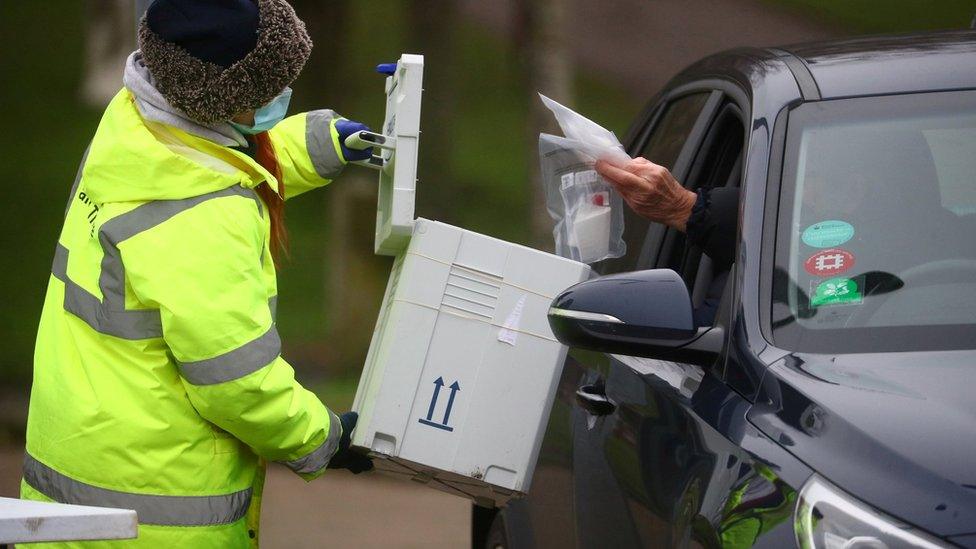
Surge testing aims to get everyone over 16 years old to provide samples whether they have Covid-19 symptoms or not
Surge testing - or mass testing - for the South African variant of Covid-19 is being expanded in several areas across England, including the IP22 postcode in Norfolk. What does this mean to the area?

Why IP22?
The IP22 postcode straddles part of the Norfolk/Suffolk border, and a "very small number of cases" of the South African variant have been found there, according to public health officials at Norfolk County Council, although they would not provide a precise figure.
The surge testing will only target Diss and Roydon.
Diss is a small market town about 20 miles south of Norwich, while the village of Roydon lies about a mile west.
Together they have a population of about, external 11,200 residents.
A council spokesman says it is "government policy to bring in surge testing for any cases that can't be linked explicitly to foreign travel, regardless of how small the number is".
He adds that all those who tested positive are self-isolating.
Further lockdown restrictions are not being proposed for the area.
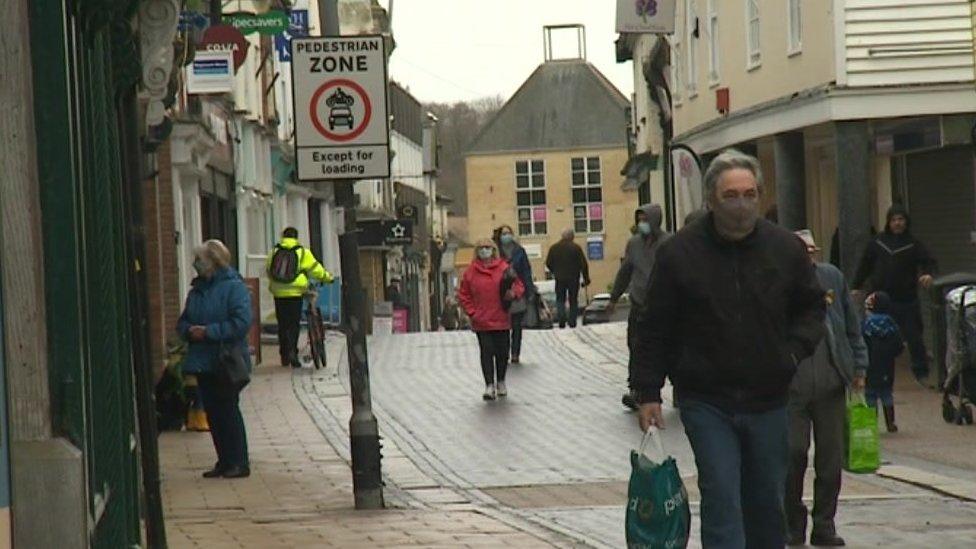
In the Diss and Roydon area 11 people tested positive for coronavirus in the seven days up to 11 February
Dr Louise Smith, Norfolk's director of public health, says they have been working with the Department of Health and Social Care (DHSC) and Public Health England "on tracing cases of this variant, and have agreed a programme of local testing".
"Thanks to our close working with the Quadram Institute, external in Norwich, we've been able to detect the variant originating in South Africa here in Norfolk," she said.

What will happen?
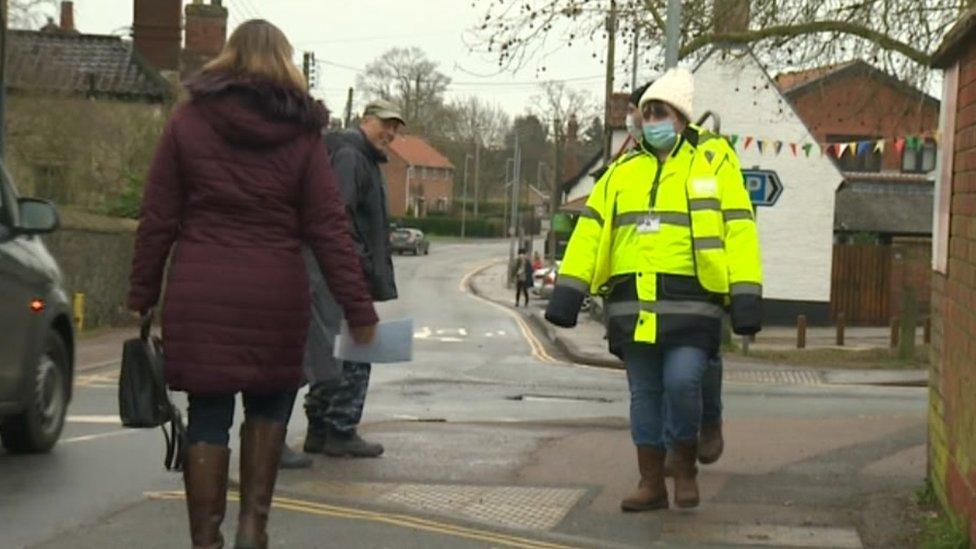
Covid support staff will be delivering tests to vulnerable and disabled people who cannot leave their homes
Door-to-door testing of adults will be carried out from Friday.
John Fuller, leader of South Norfolk District Council, said: "Last year our residents worked together to turn the tide of rising numbers in Wymondham.
"Now we need to pull together again and I am asking every resident in Diss and Roydon to help us by taking a test."
A county council spokesman said: "Every person living in Diss and Roydon over the age of 16 is strongly encouraged to take a PCR Covid-19 test this week, even if they are not showing symptoms."
Tests can be booked with mobile units which will be deployed at:
Diss Youth and Community Centre, (19-25 February, opening 09:00-15:00 GMT)
Roydon Community Centre (19 February to 4 March, opening 12:00-18:00)
Diss Leisure Centre (19 February to 4 March, opening 09:00-15:00)
Households will receive a letter in the next few days telling them how they will be tested.
People can book tests via the government's testing website, external.
Vulnerable people can request to have a test delivered and collected from their home.
Allow X content?
This article contains content provided by X. We ask for your permission before anything is loaded, as they may be using cookies and other technologies. You may want to read X’s cookie policy, external and privacy policy, external before accepting. To view this content choose ‘accept and continue’.
Paul Hunter, professor of medicine at the University of East Anglia, says the testers will collect as many swab samples as possible from local people.
"The idea is to see how widespread the South African variant is within the local communities, and try and work out where that person they know about got their infection, and make sure the currently-infected person hasn't spread that to their neighbours and friends," he says.

What is the South African variant?
The South African variant of coronavirus carries a mutation that appears to make it more contagious or easy to spread.
On 1 February, an urgent programme began offering about 80,000 people across England a test for the variant.
It is hoped the roll-out of additional community testing will help reduce the spread of infection by finding asymptomatic people who will then self-isolate.
When outlining the surge testing programme, Health Secretary Matt Hancock said there was no evidence the South Africa variant causes more serious illness for the vast majority of people who become infected.
But there are concerns it can spread more readily and vaccines may not work quite as well against it.
The DHSC said positive cases will be sequenced for genomic data to help scientists and public health officials improve their understanding the South African variant and its spread.
"Further data on surge testing will be provided in due course," a department spokesman said.

What are the numbers for coronavirus at the moment in IP22?
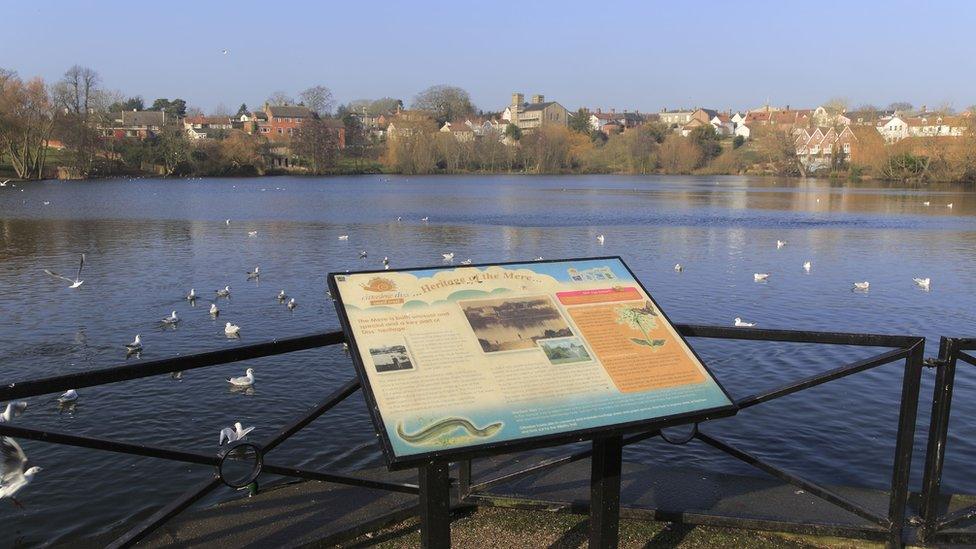
Together, Diss and Roydon have a population of about 11,200 residents
According to the latest government figures, external, in 11 people in the Diss and Roydon area tested positive for all variants of Covid-19 in the seven days to 11 February - a decrease of two on the figure for the seven days to 4 February.
In the wider South Norfolk district, the Covid-19 rate had gone down from 176 cases per 100,000 people in the week to 5 February, to 101 cases per 100,000 in the week to 12 February.
Since the start of the pandemic until 5 February, there had been 200 deaths of people in South Norfolk within 28 days of having a positive Covid-19 test, according to the government, external.

Find BBC News: East of England on Facebook, external, Instagram, external and Twitter, external. If you have a story suggestion email eastofenglandnews@bbc.co.uk
- Published16 February 2021

- Published29 July 2021
